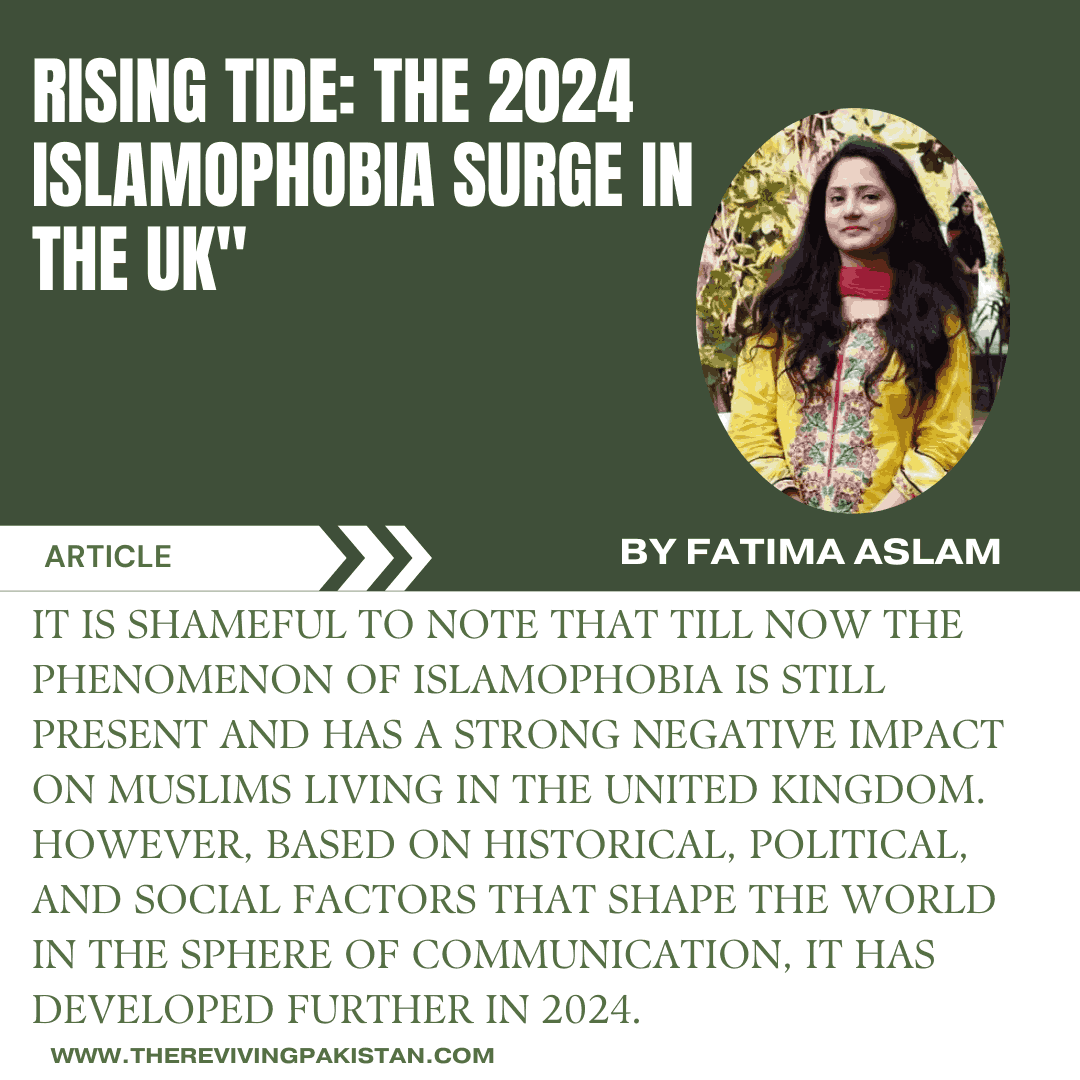About the Author(s)

Fatima Aslam
Author is a distinguished Doctor of Pharmacy, having earned her degree from Punjab University Lahore. In addition to her pharmaceutical expertise, she has successfully qualified the CSS exam, reflecting her comprehensive knowledge and commitment to public service.
It is shameful to note that till now the phenomenon of Islamophobia is still present and has a strong negative impact on Muslims living in the United Kingdom. However, based on historical, political, and social factors that shape the world in the sphere of communication, it has developed further in 2024.
However, there are signs of change that is clear, record levels of Muslims are now MPs in the UK Parliament hence more recognition of Muslims areas also means increasing power. Political Representation In the recent parliamentary election held in 2024, 25 Muslim candidates secured their Seat in the House of Commons as compared to 19 Parliament seats Muslim won in the previous election, 2019. Thus, as stated by the Muslim Network, such an increase can be explained by causes which refer both to the processes taking place in British politics and to the amplified influence of Muslim communities. Out of the listed, 18 are from the Labour Party, four seats are for independents, two are from the ‘Conservative Party, and one from the ‘Liberal Democrats’. This was achieved mainly through the massive turnout of Muslim voters in support of Gaza and the realization of five independent candidates out of which four are Muslims, which contributed to this realization.
Yet, the threat of Islamophobia does not seem to desist even when there has been political change. This is the finding from a monitor of hate crimes in the United Kingdom which pointed out that since October 7, 2016, there has been a chief of 235% in the Islamophobic attacks. In its report detailing anti-Muslim incidents, Tell MAMA recorded 2010 cases of online and offline abuses within a four month period; the period that registered the highest figures since the organization’s formation in 2011. These have been occasioned by cases like the act of painting the word ‘Hamas’ in the door of a Muslim family home, verbal and in some cases, physical assaults on Muslims in buses and other social facilities. Worryingly, more than 130 of these attacks were against Muslim women , thus depicting the group’s increased susceptibility.
The perceived religious prejudice Established that there is a high level of islamophonic attitude in the UK and this fact is also evident from the public opinion. A poll carried out in 2005 and which was quoted in a report by the charity showed that while 35% of the British population view Islam as a “threat to the British way of life”, only 30% thought it compatible with it. This sentiment is partly due to the terror attacks in London and Manchester in 2017, afterwards of which Muslims have been treated as pariahs in the community.
Main narratives have fed this hate against Muslims in the mentioned country and other comparable societies. Such include events where child sexual exploitation is attributed to the Asian origin of the offenders hence resulting in protests and a rampage against Muslims. Other narratives that have been considered to have a negative impact include the claim that mosques are conquering church, the claim that Muslims are establishing ‘no-go zones’ that operate under Sharia laws, and ideas such as the “Eurabia” idea of Muslims as violent and illiberal conquerors. There is also the so-called “Great Replacement”, according to which migrants, especially from Muslim countries, have high birth rates and are planning the physical elimination of white people. These narratives have been promoted by far-right politicians and prominent opinion-makers on social media with the result of the physical attack with far-right and racist differences in the areas like Hartlepool, London, Sunderland, Liverpool, Leeds, and Manchester.
In this case, the main perpetrators of Islamophobic narratives include Nigel Farage who leads the Reform UK party. His statement, “the truth is being hidden from us,” has fueled animosity, and little reprimand for presenting correlated risk messages. This setting of fear and paranoia has been reinforced by official myths like one that came up after the July 29, 2024, stabbing attack in the Southport. Catastrophe involved the death on the spot of three girls and ten other persons were brought to the hospital with injuries. Subsequently, authorities announced the attacker was Welsh of Rwandan origin; nevertheless, the far-right junta wasted no time branding the offender a Muslim migrant. It resulted in an increase in anti-Muslim and anti-migrant violence in the UK with two hotels that accommodate asylum seekers attempted to burn down.
New Institutionally-Inspired Islamophobia and the Appeals for LegalizationThe culmination of specific events in August 2024 following the event in Southport staking depict noticeable signs of possible local violence that may erupt into full-scale violence when influenced by the wrong performers. These acts, despite the horror, are not isolated but a product of increasing far right radicalisation in non-integrated and fragmented form within the UK where far right ideas are being produced online and normalised anti-migrant and anti-Muslim sentiment is becoming more acceptable within mainstream politics.
One of the most important objectives of the theoretical framework is to establish the fact that media representation is a primary cause of Islamophobia to a large extent. This is a fact pointed out that the deep-seated structural and institutional prejudice in Britain against Muslims is spiraling due to the encouragement of particular sections of people which include the right wing sympathizing media and some influential politicians and public speakers. This demonization of Muslims explains why Muslims have been left out and are undesirable in the society because of the culture of fear and violence that has been created by these Western politicians and media outlets.
Some prominent people demanded to qualify Islamophobia as a criminal act in the UK. While Jewish, for example, or the Sikh population is recognised as one of the racial communities in the country, Muslims are not, and hence, are not entitled to the provisions of the racial equality legislation.
The aforementioned legal relationlessness is a point well made by muslims of uk who claim that the Muslims are feeling alientated and unprotected by the system .
Hate crime is something that should be unlawful meaning that those persons who target persons due to the religion that they practise or that they are suspected to be practitioners of should be punished.
Being a Global Vice with Unique Local ConnotationsAs it has been already established, Islamophobia does not affect only the selected nation, but it is a global experience with distinct impacts unveiled in Europe. The violation of the human rights of Muslim minorities has caused concern in such countries as the United Kingdom due to the inability of the institutions and laws to safeguard the Muslims.
The emergence of new threats in the form of numbers of Islamophobic acts against mosques and individuals in the streets demonstrate the necessity of tackling this problem today.
To this, it could not have said it better by one muslim citizen that “it can happen from one day to another terrible attacks on Muslim.” As the year 2024 progresses, the question that lingers on is how the UK is going to endeavour to fight, root out the vice of Islamophobia in the society, political arena, and legally to give Muslims the needed protection they deserve to live as full-fledged citizens in the UK. While political inclusion of the Muslim minorities appears to be on the right track, there is still a long way to go when it comes to getting rid of Islamophobia without the help of legal reform.

